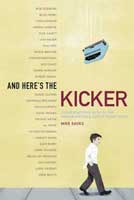An Excerpt from “And Here’s the Kicker”: George Meyer Interview
Filed Under Comedy Writers, Print
 Mike Sacks’s book “And Here’s the Kicker”
Mike Sacks’s book “And Here’s the Kicker” is out now. It features over 20 interviews with humorists and comedy writers from the time of the Marx Bros to today. If you’re a comedy nerd, Mike probably talked to one of your favorites.
I can’t praise “And Here’s the Kicker” enough. It treats humor writing as less than a tab A into slot B affair and interviews comedians with intelligence and a level of foreknowledge that keeps it from asking unproductive questions like “where do you get your ideas?” Instead the book grants a sense of how to think like a humor writer, something that’s much more worthy in the long term.
This excerpt from a conversation Sacks has with longtime Simpsons’ comedy writer George Meyer shares some of that insight:
Sacks: You’ve mentioned in the past that some of your best writing is done when you go into sort of a trance. Do you consider writing almost a form of hypnosis, where you lose track of time?
Meyer: Losing track of time is a sure sign that you’re immersed in the joy of the experience. You’re in the state that [psychology professor and author] Mihály Csíkszentmihályi calls “flow.” Actually, I had to be in that state now, just to get his name right. The work you do in this state has grace and ease and resonance. It’s the opposite of what Michael O’Donoghue used to call “sweaty” comedy, when you’ve laboriously squeezed out something tedious, and the effort shows.
When you’re “in the zone,” a joke will just land on you like a butterfly, and only if you scrutinize it later do you see how it came together from disparate elements. Maybe it’s an amalgam of an old half-idea, or something you saw on your way to work, or a strange symbol on someone’s T-shirt. And it happens in an instant. Of course, this state is elusive; it has to be cultivated.
How do you cultivate it?
You have to be prepared. You need basic writing skills, of course, but you also want to have lots of raw ingredients rattling around in your skull: vivid words, strange song lyrics, irritating euphemisms, disastrous experiences that have been bothering you for years. To feed this stockpile, you need to expose yourself to the real world and all its hailstones.
The other essential is humility. You have to be willing to look stupid, to stumble down unproductive paths, and to endure bad afternoons when all your ideas are flat and sterile and derivative. If you don’t take yourself too seriously, you’ll bounce back from these lulls and be ready for the muse’s next visit.
What is it about writing in a group situation that you enjoy? Do you actually prefer this process to writing alone?
Writing solo is lonely and you feel the heat—you want to keep topping yourself. I used to berate myself if I couldn’t think of a killer joke for every spot, but I gradually eased up on that. You can’t keep bitch-slapping your creativity, or it’ll run away and find a new pimp.
That reference to that stockpile comes into play a little later in this excerpt:
Sacks: Jon Vitti, another Simpsons writer, once told The Harvard Crimson, “The physical pain [that] lousy comedy costs George is incredible. You don’t want to be responsible for that.”
It only hurts me if I had a hand in it. I guess I find life so disappointing that I can’t bear to be part of the problem.
Sacks: Are there specific comedic tropes that drive you crazy?
Just material that’s lazy and fake. For instance, when a character has to think of a phony name, sees an ashtray, and then calls herself “Susan Ashtray.” That’s boring. Billy Wilder’s first commandment was “Thou shalt not bore.”
It’s easy to pick up bad habits from watching hackneyed comedy. You’ll find yourself resorting to stock situations, straw men, and hokey resolutions. An artful slice of life, even if it isn’t totally free of editorial contrivance, will inspire you to build your work on the bedrock of reality.
That’s just a small part from a single interview. There’s more where that came from (including other excerpts on the “Kicker” website. Buy this book.

Leave a Comment
Commenting is not available in this channel entry.